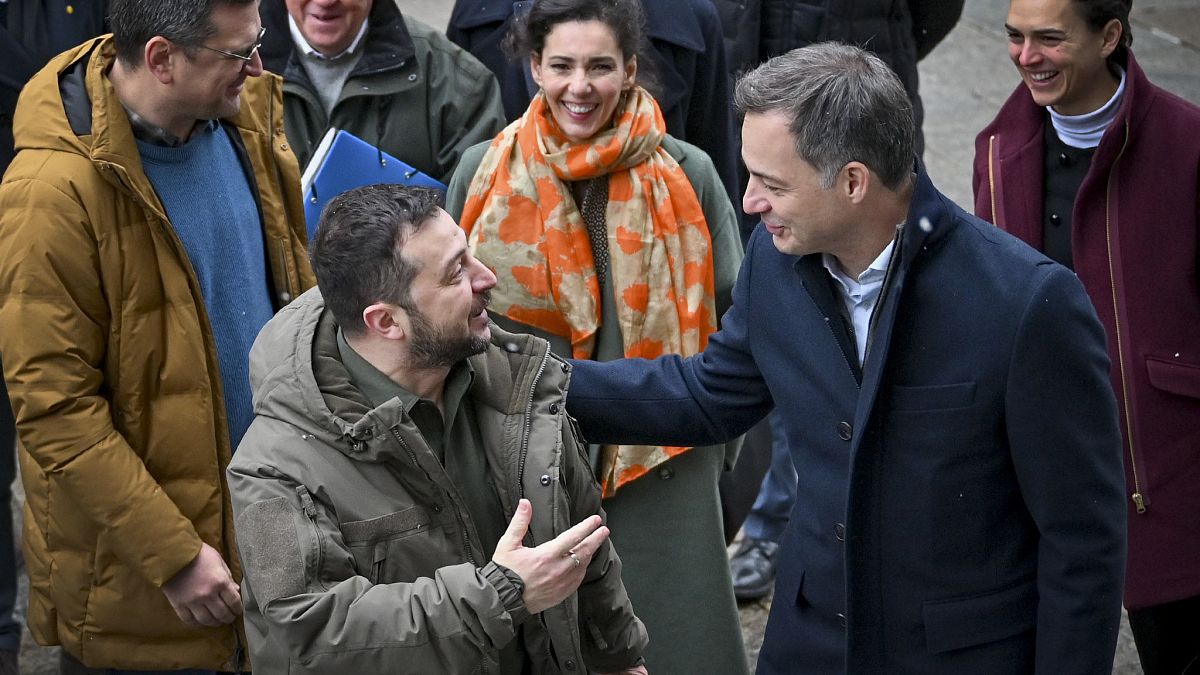Several European leaders attended the commemorations in Kyiv of the Holodomor, the Soviet-era famine that Ukraine considers was an act of "genocide" by Stalin.
Ukraine accused the Kremlin on Saturday of using the same "genocidal" tactics that it used against it in the 1930s under Josef Stalin, on the 90th anniversary of the Soviet-era famine that has taken on new resonance since the Russian invasion.
The country has received a stream of further messages of support, as several European leaders travelled to Kyiv for the commemorations of the Holodomor, which Ukraine considers was "genocide".
It comes as Ukraine grapples to repel invading Russian forces and deals with massive power outages across the country after waves of Russian air strikes on vital infrastructure.
In November 1932, Soviet leader Stalin dispatched police to seize all grain and livestock from newly collectivised Ukrainian farms, including the seed needed to plant the next crop. Millions of Ukrainian peasants starved to death in the following months from what some historians say was premeditated mass murder.
"On the 90th anniversary of the 1932-1933 Holodomor in Ukraine, Russia's genocidal war of aggression pursues the same goal as during the 1932-1933 genocide: the elimination of the Ukrainian nation and its statehood," Ukraine's foreign ministry said in a statement.
"The political and ideological narratives of the Stalinist era, in particular presenting the image of the so-called 'hostile West' and the denial of the existence of Ukraine as an independent state, are actively reproduced today."
"The Russians will pay for all of the victims of the Holodomor and answer for today's crimes," Andriy Yermak, the head of Ukraine's presidential administration, wrote on Telegram.
"Once they wanted to destroy us with hunger, now – with darkness and cold," President Volodymyr Zelenskyy wrote, also on Telegram. "We cannot be broken."
De Croo pledges Belgian support
Belgian Prime Minister Alexander De Croo, making his first visit since the start of the Russian invasion, stressed the importance of standing with Ukraine now that Russia is turning against the country's population and infrastructure.
He and Zelenskyy signed a declaration of support for Ukraine's membership with the EU and NATO.
The Ukrainian president thanked the Belgian leader for the unwavering support, and in particular noted that Belgium "is the leader in the volume of frozen Russian assets – €50 billion, even more".
The prime minister tweeted to say that Belgium was "releasing new humanitarian and military aid", and was one of the first countries to back Zelenskyy's initiative to get Ukrainian grain to world markets.
Belgium is to provide additional financial support of €37.4 million for Ukraine, according to the Belga news agency.
The prime ministers of Poland and Lithuania, Mateusz Morawiecki and Ingrida Šimonytė -- two of Ukraine's closest supporters -- met with their counterpart Denys Shmyhal.
The three leaders issued a joint statement after the meeting stressing their continued support for Ukraine and denouncing Russia's actions.
German Chancellor Olaf Scholz announced in a video an additional €15 million in aid to support Ukrainian grain exports, disrupted by the war. The German parliament moved on Friday to define the Holodomor as "genocide".
French President Emmanuel Macron also pledged an additional €6 million for grain exports, which are vital for the supply of many countries in Africa and Asia.
"We have chosen to act in solidarity with the most vulnerable countries. Russia, on the other hand, continues to use hunger as a means of pressure and food as a weapon of war," he said in a message.
'History repeating itself'
At the Holodomor memorial centre in central Kyiv, a dozen Orthodox priests dressed in black and silver robes gathered on Saturday for a religious ceremony to honour the victims of the famine.
"It was an artificially created genocidal famine... Now that we are living through this massive war launched unprovoked by Russia against Ukraine, we see history repeating itself," 38-year-old Pope Oleksandre Chmurgin told AFP.
Among those gathered to commemorate the victims of the famine, lawyer Andrey Savchuk, 39, spoke of an "irreparable" loss for Ukraine.
"Stalin's system, the repressive state wanted to destroy Ukraine as a nation. Today we see that Stalin's efforts are being continued by (President Vladimir) Putin," he said.
Russia rejects classification of the famine in the early 1930s as genocide, arguing that there were not only Ukrainian victims, but also Russians, Kazakhs and others.
On the frontline, prisoner exchanges between Russia and Ukraine continued on Saturday with 12 people freed on the Kyiv side. Moscow announced that it had recovered nine of its men.
In Dnipro, in central Ukraine, a Russian bombardment injured at least 13 people, according to regional governor Valentin Reznichenko.
In the capital, where part of the population has spent the last three days without electricity after massive Russian strikes on Wednesday, the municipality announced that it had restored 75% of the power supply and 90% of the heating, with temperatures approaching zero degrees Celsius.
